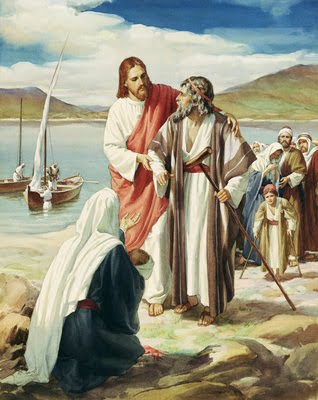Monday: Jesus’ Mission Statement
Whether it was the prescribed reading for the day or whether Jesus intentionally found the relevant verses (Isa. 61:1-2) in the scroll He was given to read, it was no coincidence these verses were the text for His first public sermon. Neither is it a coincidence that the story of Jesus’ short sermon in Luke 4:16-21—“Today this scripture is fulfilled in your hearing” (Luke 4:21, NIV)—begins Luke’s record of Jesus’ public ministry.
Jesus seemed to be picking up the tune from Mary’s song of an “upside-down kingdom” and beginning to put it into effect in His ministry. Jesus—and Luke in his retelling of Jesus’ story—used the prophecy of Isaiah to explain what Jesus was doing and was about to do, but it was also another way of expressing what Mary had described 30 years earlier. The poor, the hurting, and the oppressed are the special focus and recipients of the good news that Jesus was bringing.
Jesus adopted these verses from Isaiah 61 as His mission statement. His ministry and mission were to be both spiritual and practical, and He would demonstrate that the spiritual and practical are not as far apart as we sometimes assume. For Jesus and His disciples, caring for people physically and practically were at least part of caring for them spiritually.
Read and compare Luke 4:16-21 and Luke 7:18-23. Why do you think Jesus answered in this way? How would you respond to similar questions about the divinity and messiahship of Jesus?
When Jesus sent out His disciples, the commission He gave to them was also in accord with this mission. While they were to announce that “the kingdom of heaven has come near” (Matt. 10:7, NIV), Jesus’ further instructions to His disciples were to “heal the sick, raise the dead, cleanse those who have leprosy, drive out demons. Freely you have received; freely give” (Matt. 10:8, NIV). Their ministry in His name was to reflect and enact the values and principles of Jesus’ ministry and the kingdom He invited people to. The disciples, too, were to join with Jesus in His mission to lift up the last, the least, and the lost.
| How do we balance this work with the crucial message of preaching the Three Angels’ Messages to a lost world, as well? Why must all that we do be related, in one way or another, to the proclaiming of “present truth”? |


This morning I took time to read the Sermon on the Mount. The idea of the “upside down kingdom” permeates the sermon right from the beginning. Look at the Beatitudes:
There are blessings for those who struggle and for those who help. I like the blessing for peacemakers, a characteristic that is often in short supply in our highly competitive, winner take all world.
It is instructive to study the book of Matthew with the theme of the Kingdom of Heaven in mind. Matthew 13 and 18 come to mind particularly. There are two things that stand out.
1. The Kingdom of Heaven is not just something to look forward to in the future, after the second coming, but a reality now.
2 Citizens in this kingdom care for one another. They find richness in sharing. serving, and forgiveness. Jesus answered the question of “Who’s is the greatest in the Kingdom of Heaven?” by placing a child among them and saying that except we become like little children, we won’t even enter the Kingdom of Heaven.
Even after spending 3 years with Jesus, James and John the disciples still had not learned the upside down nature of the Kingdom of Heaven and enlisted their mother to ask for privileged positions in the new Kingdom. Not long after, Jesus answered their request by washing their feet at the last supper.
And that is just the sort of Kingdom Christians sign up for – where the least is the greatest.
Are You the Coming One, or do we look for another? John 1:29-36 and other passages indicate that before this, John clearly recognized Jesus as the Messiah. His doubt might be explained because perhaps he himself had misunderstood the ministry of the Messiah. Perhaps John thought that if Jesus were really the Messiah, He would perform works connected with a political deliverance of Israel – or at least the deliverance of John, who was in prison.
And that very hour He cured many of infirmities, afflictions, and evil spirits; and to many blind He gave sight: This was the real power of the Messiah in action; yet performed in personal, even humble ways.
i. Most of these miracles fulfill some promise found in Isaiah.
· The blind see (Isaiah 61:1, 35:5).
· The lame walk (Isaiah 35:5).
· The deaf hear (Isaiah 35:5).
· The dead live (Isaiah 26:19).
· The poor hear the good news (Isaiah 61:11).
Christ was pointing John back to the scriptures which would point to the work of the Messiah.
Go and tell John the things you have seen and heard: Jesus wanted to assure both John and his disciples that He was the Messiah. But He also reminded them that His power would be displayed mostly in humble acts of service, meeting individual needs and not in spectacular displays of political deliverance.
Blessed is he who is not offended because of Me: Jesus knew that the focus of His ministry was offensive to the expectation of the Jewish people, who longed for political deliverance from Roman domination.
We are to serve others with a Christlike spirit. To do the same type of work Jesus did. We are to present the gospel to everyone, poor and rich alike. Healing the sick, whether in body or mind, is to go hand in hand with teaching the gospel message.God is always by our side watching and giving us guidance through the Holy Spirit.